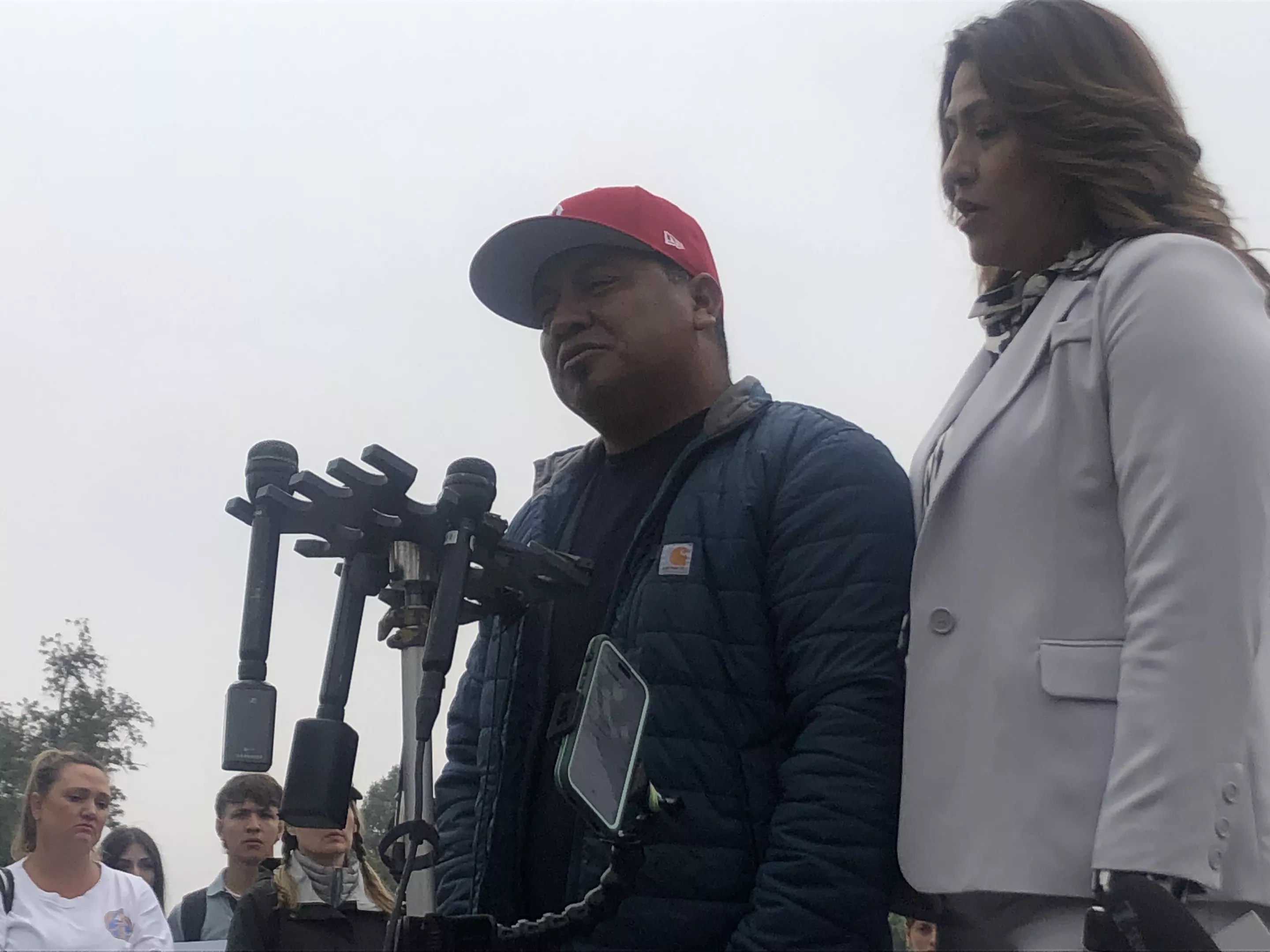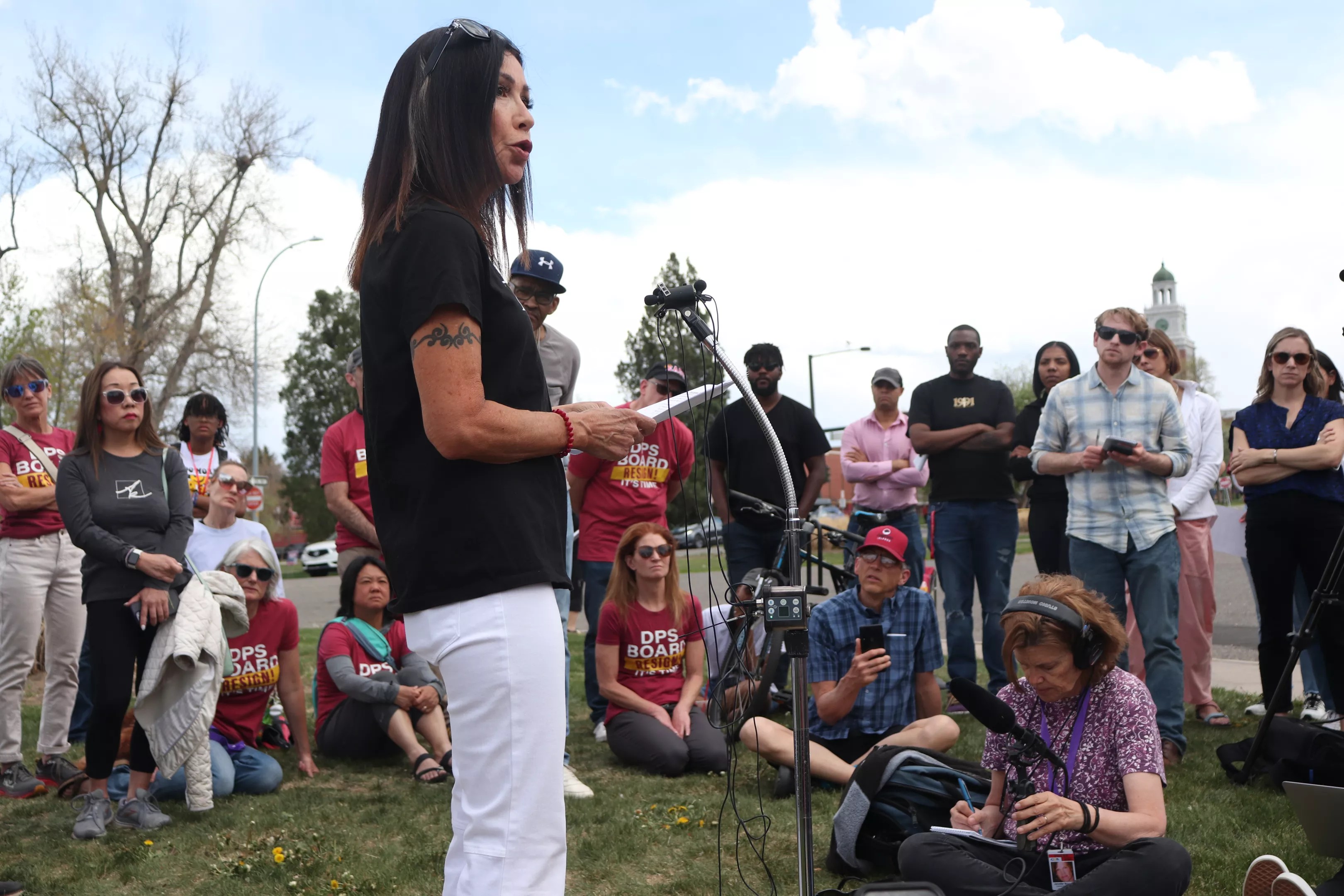
Benjamin Neufeld

Audio By Carbonatix
Amid an ongoing storm of criticism surrounding school safety and leadership within Denver Public Schools, on May 18 the Denver Board of Education decided to give Superintendent Alex Marrero a raise – a move that the family of slain East High School student Luis Garcia calls “a slap in the face.”
Boardmembers voted 4-3 in favor of the pay bump during a public meeting.
The next day, the family of Garcia – who was shot and fatally wounded while sitting in a car just outside of the East High campus on February 13 – spoke out for the first time at a gathering outside the school. They condemned DPS and Marrero for failing to take immediate action after Luis’s death, which ignited a conversation around SROs and school security.
“Was Luis’s life not enough?” asked Jovana Garcia, the older sister of Luis, who blasted Marrero as “one of the people that, I think, failed my brother.”
She noted how the superintendent showed up at the hospital the day after Luis was shot and asked to see him. “The entitlement he had to even ask when not even his siblings were allowed to see him,” Jovana reported. “We were at the hospital every day for two weeks, and that was the only time I personally saw or spoke to him. And I don’t think he said any of the right things, which made it very upsetting.”
“I think he’s a joke,” says Santos Garcia Jr., Luis’s brother.
Marrero’s new contract boosts his salary from $276,000 to $305,000.
Boardmembers Michelle Quattlebaum, Scott Esserman and Auon’tai Anderson voted against Marrero’s pay increase. Quattlebaum took issue with a lack of transparency during the contract’s negotiation – the details of which were not made public prior to the vote. Anderson said he was concerned with the timing.
Marrero started as superintendent in July 2021, with a two-year contract that was extended to four years just five months later. That agreement is set to expire in 2025.
“I firmly believe that such matters should align with our evaluation cycle, which is scheduled for October,” Anderson, who’s the board’s vice president, said in a statement he read at the May 18 meeting, and also posted on Twitter. “It seems premature to authorize a compensation increase without the necessary data to justify the decision, thereby disconnecting it from the performance review process.”
Anderson added that while he is not inherently opposed to giving Marrero a raise, right now is not the right time. “Our students and staff are facing significant challenges related to safety, mental health and ensuring academic success,” he said. “As a board, our undivided attention should be dedicated to resolving these immediate problems. I just don’t believe that right now is the appropriate time for us to consider this.”
School safety concerns and the first draft of a DPS long-term safety plan have been the source of community concern in recent months, putting a spotlight on Marrero and the school board. After the March 22 shooting at East High – student Austin Lyle shot and injured deans Eric Sinclair and Wayne Mason before later committing suicide – the district faced intense pressure to resolve threats to DPS students and staff.
Following the Lyle incident, the board sent a memo directing Marrero to “develop a systemic Long-Term Safety Operational Plan.” According to the memo, Marrero must “engage in thorough community engagement with students, teachers, parents, families, school leaders, and others in collaboration with the Board.” Marrero released a first draft of the plan on May 1; the final version must be submitted to the school board by June 30.
Some members of Denver’s Latino community who send their kids to DPS schools have expressed concern that the public engagement process for the development of this safety plan has been rushed and incomplete. At a May 9 community feedback session hosted by the Latino Education Advisory Council (LEAC), many students and families said they worried that Black and brown voices were being ignored by the district, and that both proposed and already implemented changes to DPS policy were reactionary and motivated by the concerns of white parents.
Some pointed out that East High School has been given lots of attention while safety incidents at other schools have been largely ignored. Since the East High shootings, more and more community groups have expressed similar concerns – including the East High-associated Parents – Safety Advocacy Group.
P-SAG, which formed in the days after the Lyle shooting, holds meetings outside East High every Monday and hosted the May 19 gathering with the family of Luis Garcia. Members acknowledge that they started as a community made primarily of East parents, but point out that P-SAG has since grown into a larger and more representative group.
And in any case, P-SAG says that the school board has been “dismissive” of the group’s concerns, noting that it has a long list of “asks” that the district has yet to address.
Theresa Peña, an active P-SAG member who served on the DPS school board from 2003 to 2011, says that the board has brushed off the group’s input by saying P-SAG does not represent the district as a whole. According to Peña, it’s the school board’s job to make decisions with the entire community in mind, while taking the concerns of P-SAG – as a significant part of the community – into account.
“That is their job,” she says. “They are abdicating their responsibility when they say, ‘Well, you’re not representing the larger community.’ Well, that’s why you got elected.”
Peña adds, “This board is taking this situation and making it very political. I would argue that there’s actually a lot of consensus out in the community.” The division, she says, is over school resource officers.

Theresa Peña speaking at a P-SAG meeting on May 8.
Benjamin Neufeld
Rather than bring back SROs, Peña says she would prefer that the board and superintendent focus on more impactful policies – such as improved discipline policy and better training for educators involved in discipline. She adds that P-SAG will continue to push its policy ideas and priorities, regardless of the district’s reception.
Movimiento Poder, a southwest Denver-based community organization, takes a hard-line position against SROs, but shares in P-SAG’s disappointment with the district’s engagement process and response to community members.
The group takes aim at Marrero in particular, saying that he called it “unprofessional” soon after becoming superintendent when members tried to share their concerns about armed DPS safety patrol officers. Elsa Bañuelos, executive director of Movimiento Poder, says that Marrero was “very disrespectful and discounted a lot of the concerns our students had at that time.”
Bañuelos says that their relationship with Marrero has been tense since then and that her organization feels like “the board is giving a lot of authority to the superintendent” to develop this new safety plan; they think the community feedback process for the safety plan “is set up to favor the existing plan.” Bañuelos agrees with Anderson that the timing isn’t right for giving Marrero this raise.
Movimiento Poder has been around since the 1990s and has played a major role in advocating for the removal of SROs from Denver schools. The DPS board removed SROs in the summer of 2020, but reversed its decision following the March 22 shooting at East High.
On May 17, Movimiento Poder released a report criticizing that move. “The superintendent’s proposal is deeply insulting to the countless students, parents and community members who have worked tirelessly for decades to address the criminalization of DPS students, and particularly BIPOC students,” the organization said.
According to the Movimento Poder report, “The community engagement process for the superintendent’s proposal has been a farce.”
There were 4,929 arrests or court referrals of DPS students between the 2014-2015 school year and 2020, when SROs were removed, according to the report. Since then, the report counted only 175 tickets and arrests.
At a school board public comment session on May 15, numerous community members expressed similar concerns and called the reintroduction of SROs “reactionary.”
Still, the family of Luis Garcia expressed support for SROs at the May 19 gathering outside East. Speaking through an interpreter, Santos Garcia, Luis’s father, said, “When I saw the patrol that they put in front of the school, I thought maybe my son would still be here with us today; if things were different before, maybe there would be that possibility.”
Garcia said that when he and his family asked the police why there was no security at the school, the police explained that “they didn’t want to give any tickets to students that were selling drugs or doing drugs,” Garcia said. “They are taking care of those kids, but who is taking care of our kids? The kids that go to school, that work, that play sports, the good kids. Who takes care of them?
“I don’t want any more families damaged like ours,” said Garcia.
Santos Garcia Jr. says he has attended many of the safety plan feedback meetings since his brother’s death. “I think the people in charge don’t take certain people seriously,” he said. “It’s just very frustrating to see that tragic events have to happen in order for them to realize that they’re doing things wrong.”
He then echoed his father’s sentiment: “When you hear why they don’t bring back SROs or things like that, it’s because they want to keep the bad kids out of the justice system. But what about the good kids?”
The board and the superintendent have not yet responded to a request for comment regarding the May 19 gathering. But at the May 18 board meeting, Marrero did address community concern about the short timeline for feedback on the safety plan. “There is some desire for a longer runway,” he said. “I am not yet asking for that.”
The second draft of the safety plan is slated for release on May 26.
In the meantime, the Garcia family has sent a notice to the city and school district of their intent to file a wrongful-death lawsuit.